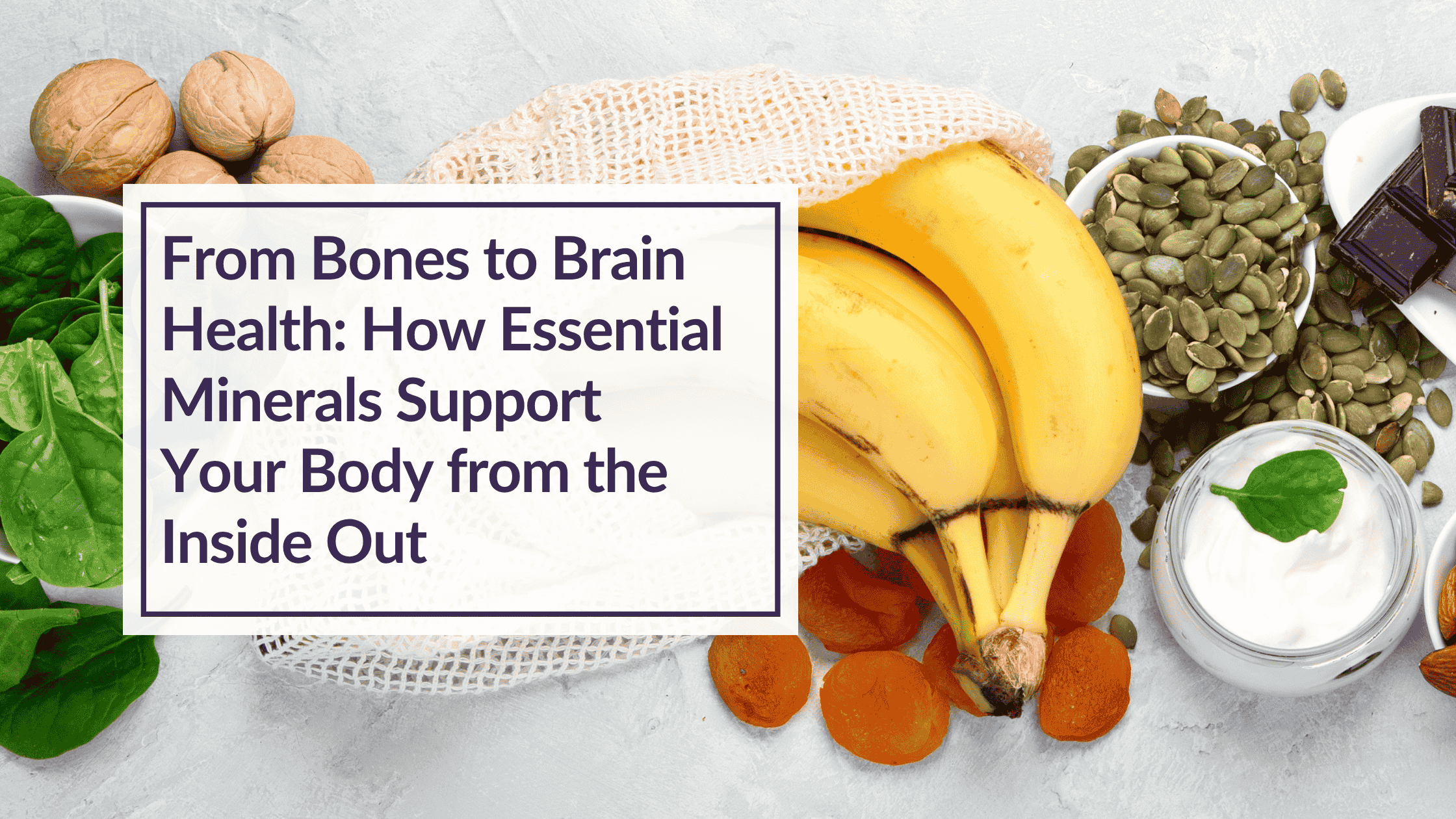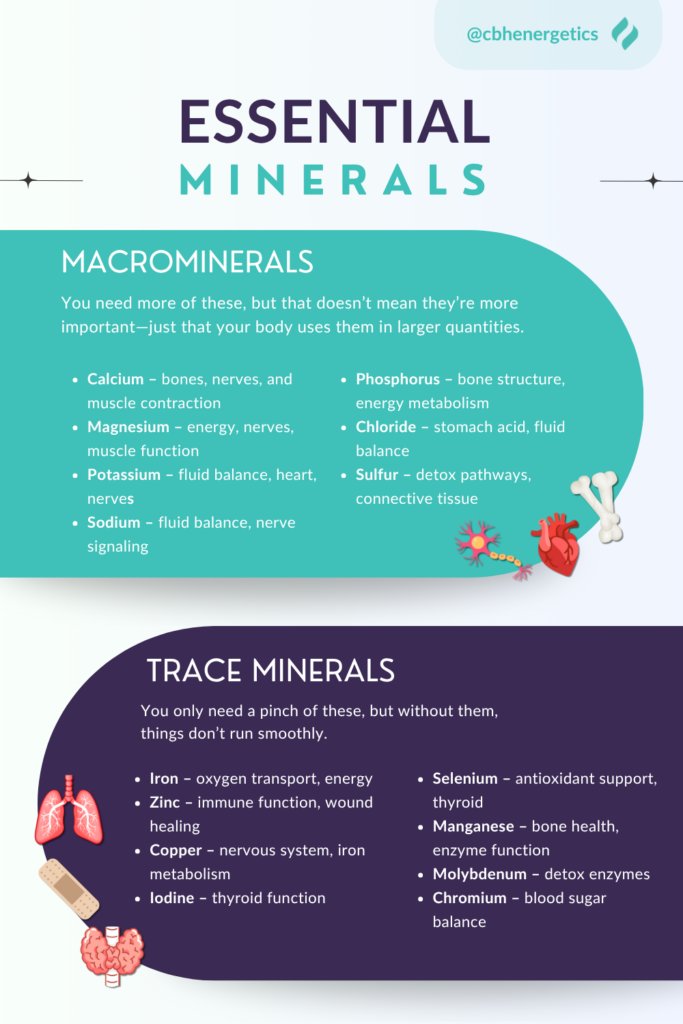
How Essential Minerals Help You Feel Your Best Every Day
Minerals have a hand in nearly everything your body does. Whether it’s steady energy, better sleep, mental clarity, or feeling less overwhelmed, essential minerals help you function from the inside out. And when things start to feel “off,” mineral imbalance is often worth a closer look.
What Are Minerals?
Minerals are natural elements found in the earth and in your body, too. Some are metals, others are salts, but all are inorganic, meaning they don’t break down in heat or light the way vitamins do. That makes them stable, long-lasting, and incredibly useful to your body.
Your body doesn’t make minerals independently, so you must get them from food, water, or supplements.
Essential vs. Non-Essential Minerals
Minerals fall into two broad categories: essential and non-essential.
Essential minerals are the ones your body absolutely needs to function. These are your go-to players in key body processes like muscle contraction, nerve signaling, enzyme production, energy metabolism, and maintaining strong bones and teeth.
Essential minerals are further divided into:
- Macrominerals – needed in larger amounts (like calcium and magnesium)
- Trace minerals – needed in very small amounts (like zinc and iodine)
Non-essential minerals are elements like boron and silicon. They aren’t considered “essential,” but they still have a reputation for supporting things like bone strength and connective tissue.
Then there are things like fluoride, which is often added to water to support dental health. While it may play a role in protecting teeth, it’s not required for basic survival. Fluoride controversy exists due to the impact on bones and as a potential endocrine-disrupting chemical. Some studies note that fluoride can build bone, but not in an optimal or structurally sound way.
And then there are the ones you want to steer clear of: heavy metals like lead, mercury, and arsenic. These toxic minerals can actually compete with your essential minerals, throwing off your internal balance and taxing your detox pathways over time.
Fun Fact: The Earth’s crust comprises over 90 naturally occurring elements, but fewer than 20 of them are used in meaningful biological processes in the human body.
Bottom line? The Earth is full of minerals, but only a select few are essential minerals for health. And even those must be kept in the correct ratios to keep you feeling your best.
Here is a list of essential minerals!

How Essential Minerals Work Together to Support Your Whole Body
Essential minerals don’t just work alone—they function as a network, backing each other up and stepping in when others need a hand. When they’re balanced, things run smoothly. You might feel tired, foggy, anxious, or just off when they’re not. These minerals act as co-factors, messengers, and structural components, helping your body function from the ground up, starting with your cells.
Let’s break it down by the support systems you feel most:
For mental clarity and a calmer mind…
Ever feel wired-but-tired or mentally foggy? Minerals like magnesium, zinc, and copper help your brain cells fire properly, calm the nervous system, and manage your stress response. Magnesium, in particular, is a known “calming mineral,” and a deficiency can show up as mood swings, sleep trouble, or tension.
We have a whole blog on magnesium, which you can read here.

For steady energy and a strong heart…
Your heartbeat and blood pressure rely on minerals like potassium, magnesium, and calcium to stay steady. These minerals help regulate your heart rhythm, support fluid balance, and power cellular energy production—so if your energy tanks for no clear reason or your heart flutters, a mineral imbalance could be part of the story.
For oxygen transport and cellular energy…
Iron is a key player in moving oxygen through your bloodstream. It works alongside copper, which helps mobilize iron and integrate it into red blood cells. Without that support, your cells don’t get the oxygen they need to make energy efficiently, leaving you feeling worn out, even with rest.
For bones that hold you up…
Strong bones aren’t just about calcium. You also need magnesium, phosphorus, and even trace minerals like boron to support your bone matrix. These minerals help build density, prevent breakdown, and support the enzymes that keep bones metabolically active.
Did you know? About 60% of your body’s magnesium is stored in your bones!
For metabolism and thyroid health…
If you feel sluggish, cold, or stuck in slow motion, it could be a sign your thyroid isn’t getting the minerals it needs. Iodine fuels thyroid hormone production, selenium helps convert it into its active form, and iron supports the oxygenation that keeps metabolism humming.
For fluid balance and nerve function…
Electrolytes like sodium, potassium, and chloride work in harmony to keep your fluid levels in check, inside and outside of your cells. These minerals are key for muscle contraction, nerve signals, and preventing dehydration-related fatigue or dizziness. Even mild imbalances can affect your energy, focus, and blood pressure.
For wound healing and tissue repair…
Your body uses zinc and copper in tandem to heal cuts, rebuild tissue, and support skin health. Zinc supports immune response and cellular repair, while copper contributes to collagen formation and the growth of new blood vessels at the site of injury.

What Does Mineral Imbalance Look Like?
It’s not always dramatic, but when your minerals are off, you’ll usually feel it somewhere.
Common signs of mineral imbalance may include:
- Fatigue or brain fog
- Muscle cramps or twitching
- Poor sleep or irritability
- Dry skin or brittle nails
- Irregular heartbeat or low energy
- Trouble recovering from stress, workouts, and illness
So What Throws Minerals off in the First Place?
It’s usually not just one thing.
A poor diet, chronic stress, medications like diuretics or antacids, excess sweating, gut issues that interfere with absorption, and even underlying health conditions can all play a part.
Fun Fact: You lose minerals every day just from breathing, sweating, and thinking! Your brain and muscles are mineral-hungry systems.
Why Mineral Balancing Matters
Anyone can take a supplement, but correcting a mineral imbalance is about more than that. It’s about figuring out what your body actually needs and how your minerals interact with one another.
We all have different needs based on our lifestyle, stress levels, environment, and genetics. That’s where the idea of bio-individuality comes in. For example:
- Some people may need more magnesium if they’re under a lot of stress.
- Others may have a harder time absorbing zinc due to gut imbalances.
- High calcium intake can crowd out magnesium or iron, causing downstream effects.
That’s why guessing doesn’t always work. You might be taking a supplement that looks great on paper, but if it’s not what your body actually needs, it could be adding to the mineral imbalance.
This is where testing can help take out the guesswork. Tools like bioenergetic scans test for minerals and may show a mineral imbalance.
Disclaimer: CBH Energetics does not diagnose but focuses on supporting the body through a bioenergetic and holistic approach. Many of our bioresonance scans test for nutrients, including minerals that show as bioenergetically low.
When your essential minerals are balanced, your body has the building blocks it needs to support energy, stress resilience, immunity, and more. It’s a foundational piece of the wellness puzzle that’s easy to overlook—but makes a big difference once it’s addressed.
How to Support Mineral Balance Naturally
Here are a few ways to support minerals for health, the natural way:
Eat a mineral-rich diet
Whole, unprocessed foods are your best mineral allies. Focus on:
- Leafy greens for magnesium and calcium
- Nuts and seeds for zinc and magnesium
- Seafood for iodine, selenium, and copper
- Bone broth for calcium, phosphorus, and trace minerals
- Avocados, bananas, and sweet potatoes for potassium
- Liver and red meat for iron and zinc
- Make a simple Adrenal Cocktail
The more color, variety, and natural sources you include, the better your chances of covering your essential mineral bases.
Stay hydrated with quality water
Filtered water is great for removing contaminants, but it can also strip out beneficial minerals.
Replenish by adding:
Hydration and minerals go hand-in-hand for fluid balance, energy production, and cellular function.
Cut down on processed foods
Not all foods support your mineral balance—some actually work against it. Highly processed, high-sugar diets are notorious for robbing your body of essential minerals. They may taste good in the moment, but they leave your cells starved.
Watch out for:
- Soda (phosphoric acid blocks calcium)
- Refined sugar (increases magnesium and zinc loss)
- Artificial sweeteners (may interfere with detox and mineral use)
- Alcohol and caffeine (flush out potassium and magnesium)
Minerals may be small, but their impact is anything but. From nerve function to hydration to enzyme activity, they help keep nearly every system in motion. And when things are out of balance, your body notices—even if it’s subtle.
Understanding your mineral patterns can offer a clearer picture of what your body needs to function at its best. Whether you’re fine-tuning your wellness routine or just getting curious about what’s happening behind the scenes, exploring mineral balance is a powerful step forward.
